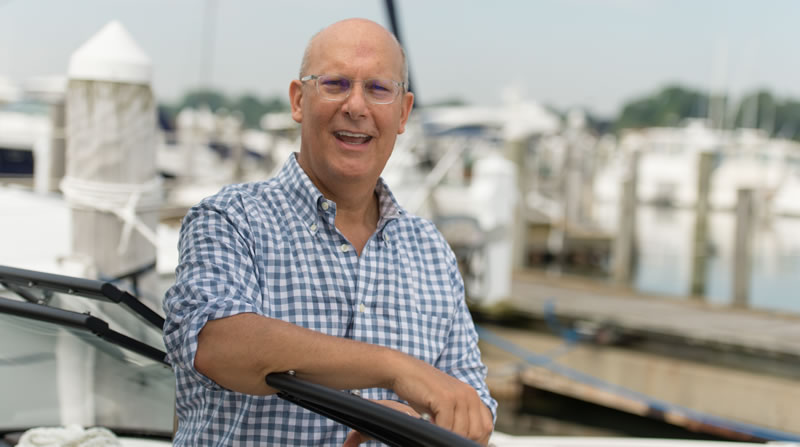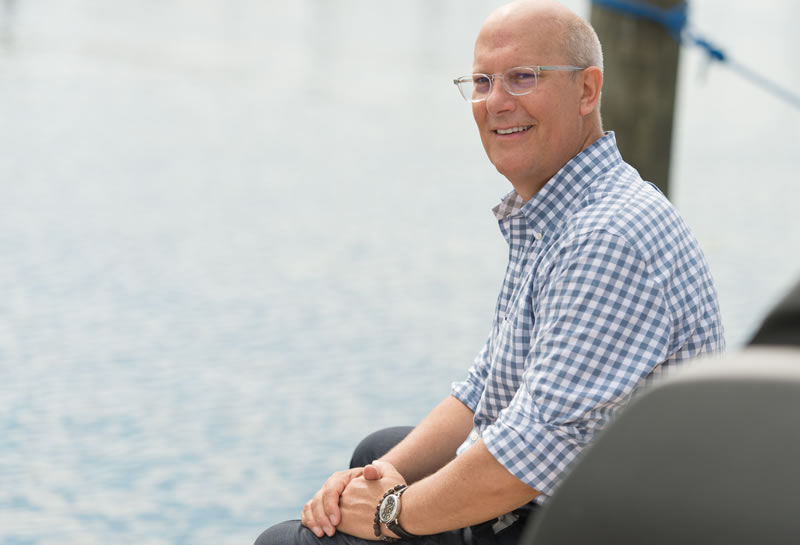Personal Growth After Cancer
A stage 4 prostate cancer patient changes careers for human connections

Jeff Smith has always been interested in self-improvement but back in 2014, at age 53, he was so busy juggling his sons’ sporting events, his own wealth management firm and family life with his wife, Lisa, that he didn’t have much free time for himself.
He’d never thought about the level of stress caused by his job, but a stage 4 prostate cancer diagnosis made him stop and rethink everything.
"Cancer makes you ask, ‘Why do you want to live? Are you willing to do everything possible to take care of yourself,’" Smith says. "My greater purpose was my family. I wanted to do anything I can."
Smith entrusted his cancer care to the University of Michigan Rogel Cancer Center and went through six rounds of chemotherapy at three-week intervals.
Smith’s oncologist, David C. Smith, M.D., explains that the past few years have brought major improvements in the care of men with prostate cancer. There are six approved therapies for cancer that continues to grow despite reduced levels of testosterone in the body (called castrate or castration-resistant prostate cancer).
Treatment options range from immunotherapy that uses the body’s immune system to deprive cancer cells of testosterone to radiation therapy and chemotherapy to kill cancer cells.
During his chemotherapy treatment, Smith became familiar with many of the complementary therapies offered to patients of the Cancer Center, such as using guided imagery to relax. He spoke to a nutritionist on the best ways to fuel his body and reached out to a therapist in the PsychOncology Clinic to help cope with the difficult emotions that accompany a cancer diagnosis.
"I knew that the PsychOncology group could help with my journey of discovery. What do you know that I don’t? They’re the experts. People should be open to self-reflection," Smith says.
Combined, the medical treatment and complementary therapies gave him a sense of control over his situation. He began to realize, however, that the stress of managing other people’s life savings didn’t seem like a healthy approach to recovering from cancer treatment.
"One of the opportunities as I learned how to deal with cancer was that I saw how the body is designed to heal, regenerate and be healthy. Even though I really liked what I did, I saw the responsibility of taking care of someone’s money was going to cause too much stress," Smith says.
He decided to leave behind all of those aspects of his life he didn’t love and start a new journey based on human connections. He sold his firm.
Smith completed treatment in 2015. His PSA level, an indicator of prostate cancer, has been undetectable since that time.
A Different, Thriving Future

With his prostate cancer controlled, Smith returns to the Cancer Center for regular screenings. He describes his oncologist, Dr. Smith, as the chief executive officer of his medical treatment.
"All the caregivers at the University of Michigan deal with this on a daily basis. There is so much hope to have and information to learn. Be in partnership with your doctor. There is gold under your feet that you can mine," he says.
"Men can still have a long and enjoyable life after prostate cancer," says Dr. Smith. "Dealing with uncertainty becomes a major focus of people’s lives, but patients often make changes to reestablish control to some degree when their future is threatened. It is possible for patients to apply some alternative principals earlier in the process of the disease to improve their quality of life."
Smith has taken his passion for learning and self-development and currently works with family businesses on executive coaching and succession planning. He has become certified as a Lifeline business development coach and a Conversational Intelligence coach. He also participates in a monthly radio show on WJR called The Family Business Forum.
His sons, 16 and 19 at the time of his diagnosis, are now both in college. Lisa continues to lead her public relations firm, Airfoil Group. And Smith expresses daily gratitude for the human connections that are now the focus of his life.
"Lisa and I had all kinds of thoughts and ideas of our life together. We had to let go of some dreams and that was painful. The reality was we had to deal with the cancer. Now I have an appreciation of how much positive, loving, grateful energy we have inside of us. When you go through a journey, you can make the best of it."
Jeff Smith shares his favorite self-improvement resources:
Start each day with the LifeLine Connection
Relax using the 2-step HeartMath Quick Coherence
Read the Fall, 2017 issue of Thrive.
